Analysis of Communication Skills for Business - Unit 3.26 Report
VerifiedAdded on 2023/02/03
|16
|1177
|52
Report
AI Summary
This report provides a comprehensive overview of communication skills in a business environment. It begins by exploring various communication models, including Berlo's SMCR model and the Shannon and Weaver model, outlining their components and applications. The report then delves into different methods of communication such as oral, written, verbal, and electronic methods, discussing their advantages and disadvantages. Furthermore, it highlights the principles of effective communication, emphasizing clarity, accuracy, and feedback. Finally, the report addresses common barriers to effective communication, such as emotional barriers and cultural differences, providing insights into overcoming these challenges to foster better communication within organizations. The report uses examples and references to support the points and concepts discussed.
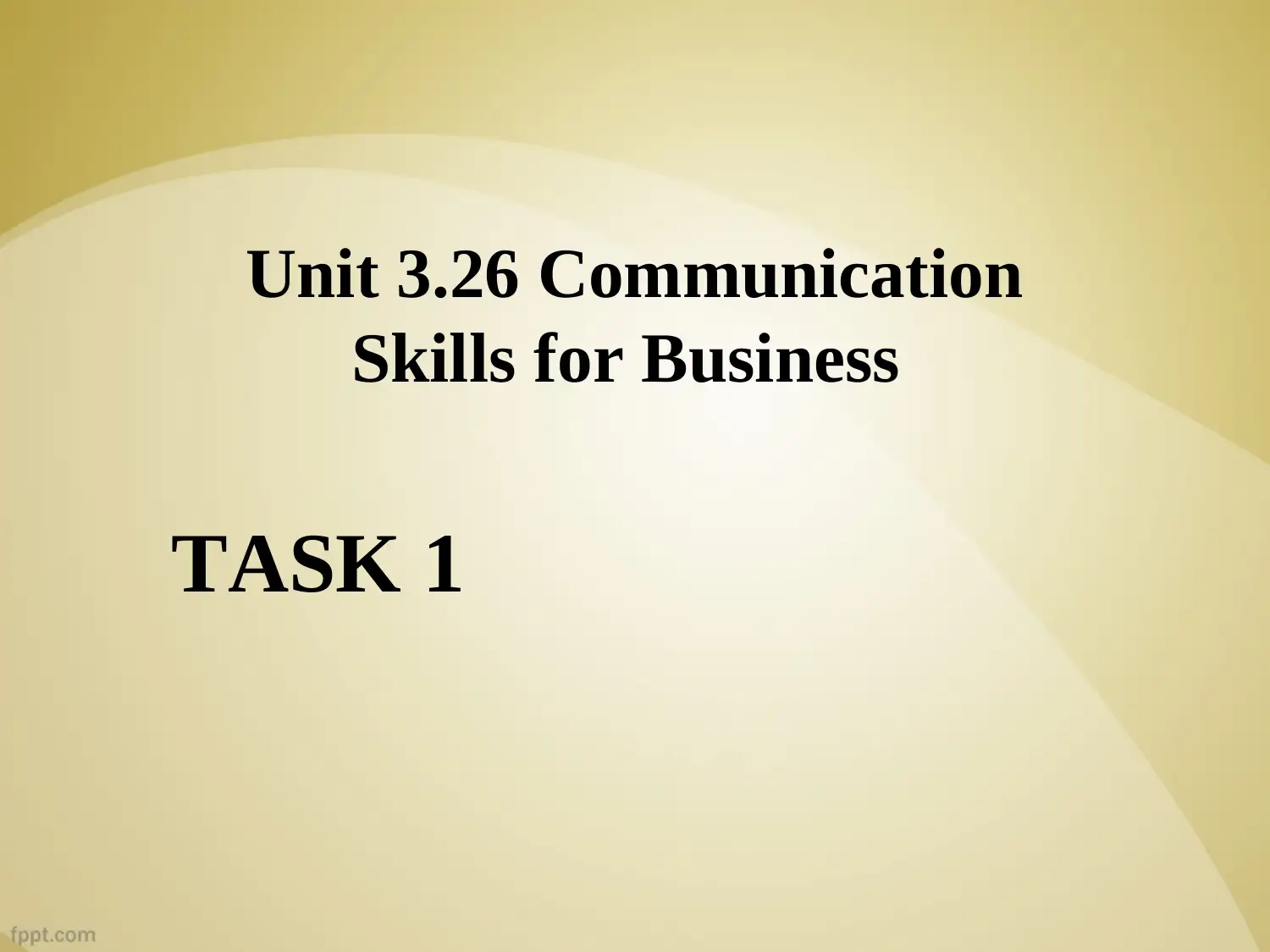
Unit 3.26 Communication
Skills for Business
TASK 1
Skills for Business
TASK 1
Paraphrase This Document
Need a fresh take? Get an instant paraphrase of this document with our AI Paraphraser
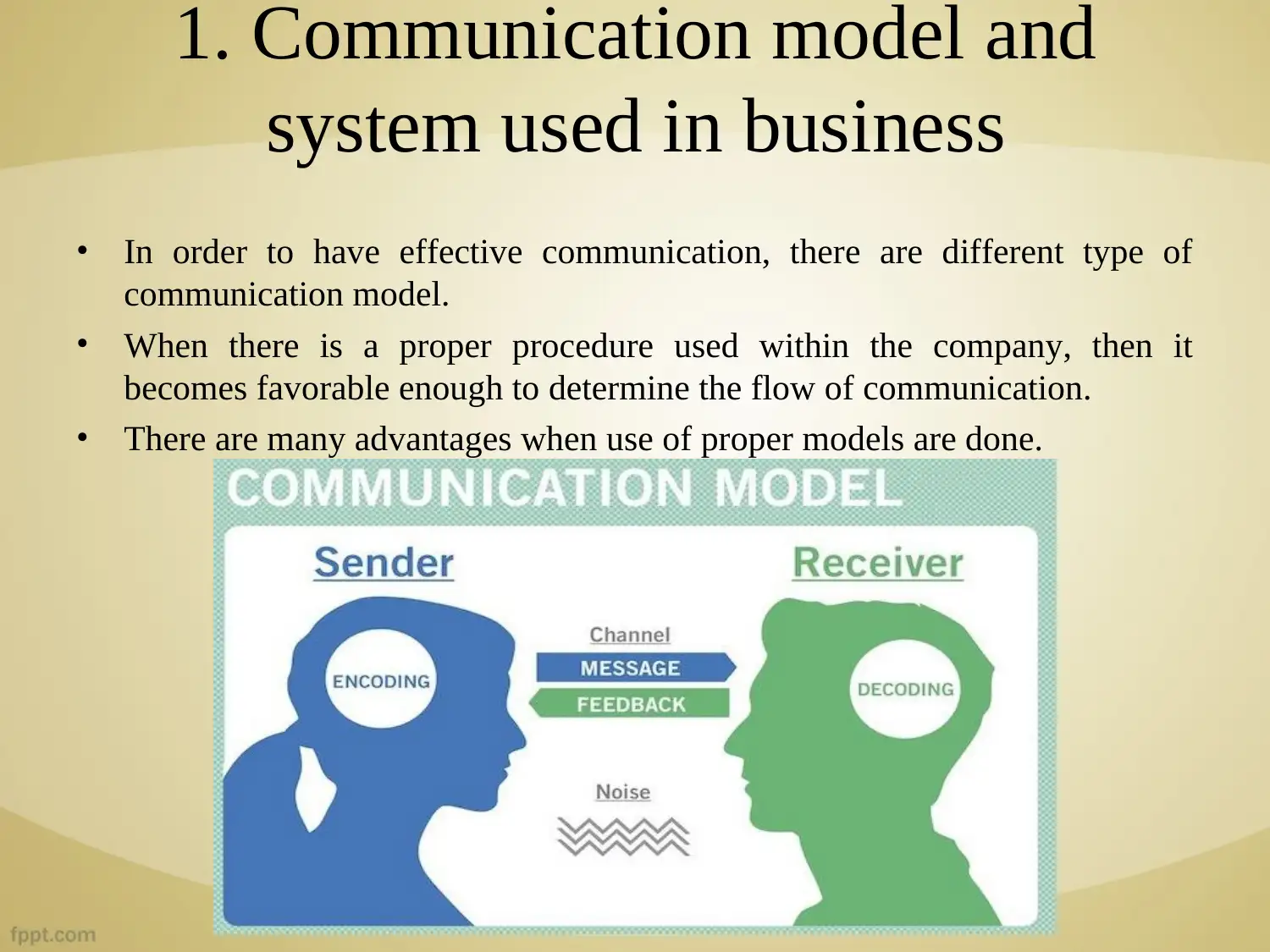
1. Communication model and
system used in business
• In order to have effective communication, there are different type of
communication model.
• When there is a proper procedure used within the company, then it
becomes favorable enough to determine the flow of communication.
• There are many advantages when use of proper models are done.
system used in business
• In order to have effective communication, there are different type of
communication model.
• When there is a proper procedure used within the company, then it
becomes favorable enough to determine the flow of communication.
• There are many advantages when use of proper models are done.
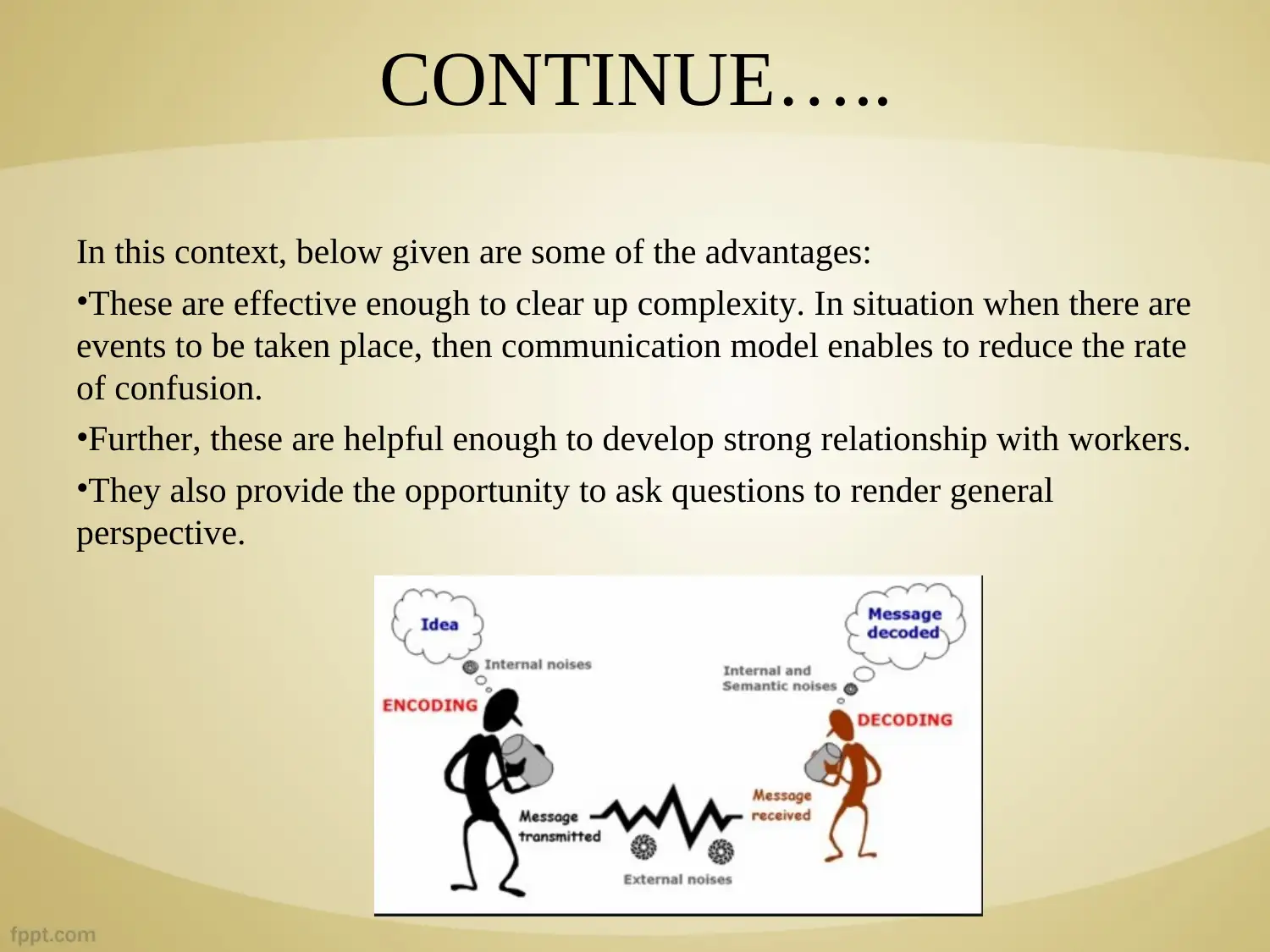
CONTINUE…..
In this context, below given are some of the advantages:
•These are effective enough to clear up complexity. In situation when there are
events to be taken place, then communication model enables to reduce the rate
of confusion.
•Further, these are helpful enough to develop strong relationship with workers.
•They also provide the opportunity to ask questions to render general
perspective.
In this context, below given are some of the advantages:
•These are effective enough to clear up complexity. In situation when there are
events to be taken place, then communication model enables to reduce the rate
of confusion.
•Further, these are helpful enough to develop strong relationship with workers.
•They also provide the opportunity to ask questions to render general
perspective.
⊘ This is a preview!⊘
Do you want full access?
Subscribe today to unlock all pages.

Trusted by 1+ million students worldwide
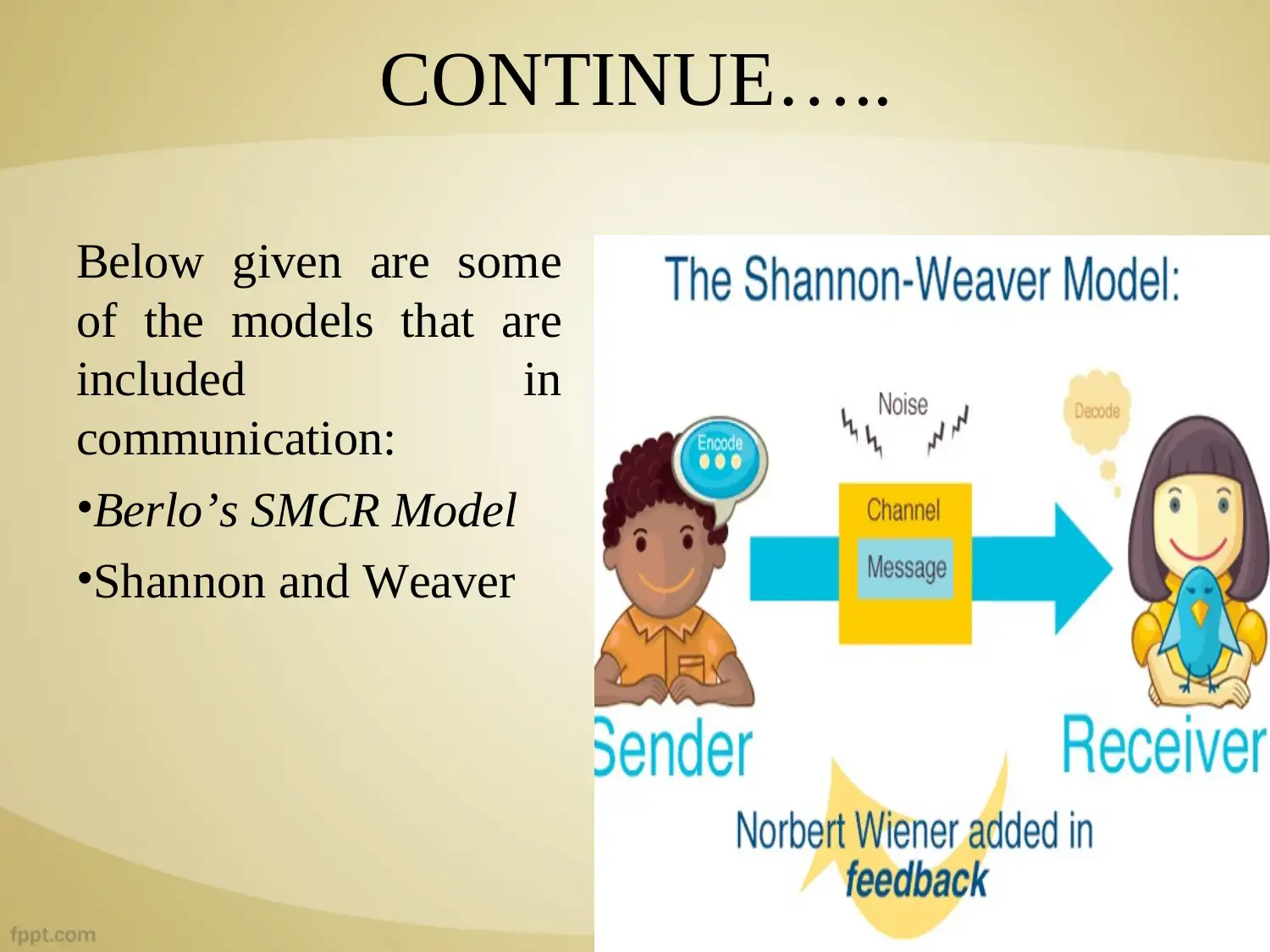
CONTINUE…..
Below given are some
of the models that are
included in
communication:
•Berlo’s SMCR Model
•Shannon and Weaver
Below given are some
of the models that are
included in
communication:
•Berlo’s SMCR Model
•Shannon and Weaver
Paraphrase This Document
Need a fresh take? Get an instant paraphrase of this document with our AI Paraphraser
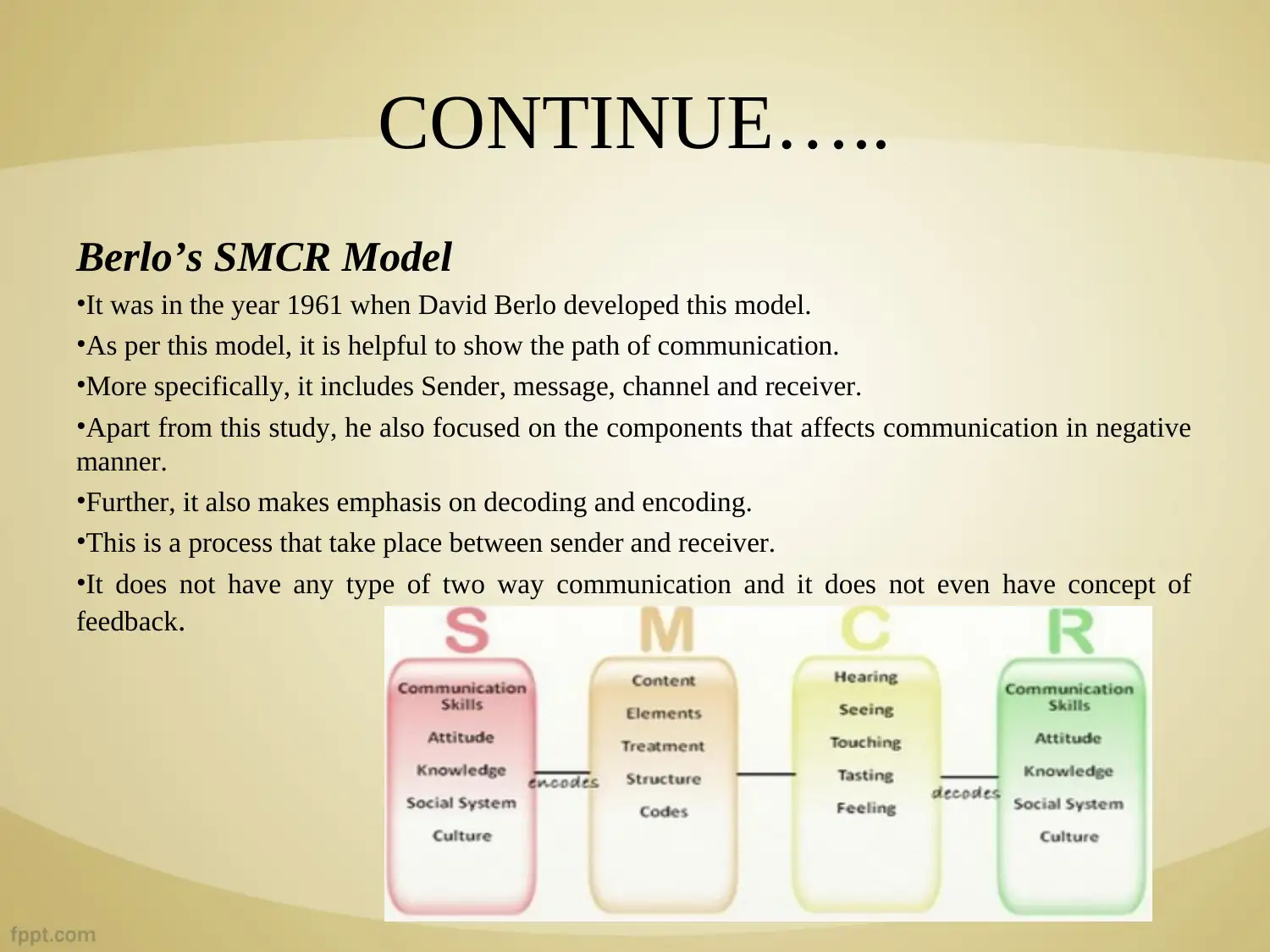
CONTINUE…..
Berlo’s SMCR Model
•It was in the year 1961 when David Berlo developed this model.
•As per this model, it is helpful to show the path of communication.
•More specifically, it includes Sender, message, channel and receiver.
•Apart from this study, he also focused on the components that affects communication in negative
manner.
•Further, it also makes emphasis on decoding and encoding.
•This is a process that take place between sender and receiver.
•It does not have any type of two way communication and it does not even have concept of
feedback.
Berlo’s SMCR Model
•It was in the year 1961 when David Berlo developed this model.
•As per this model, it is helpful to show the path of communication.
•More specifically, it includes Sender, message, channel and receiver.
•Apart from this study, he also focused on the components that affects communication in negative
manner.
•Further, it also makes emphasis on decoding and encoding.
•This is a process that take place between sender and receiver.
•It does not have any type of two way communication and it does not even have concept of
feedback.
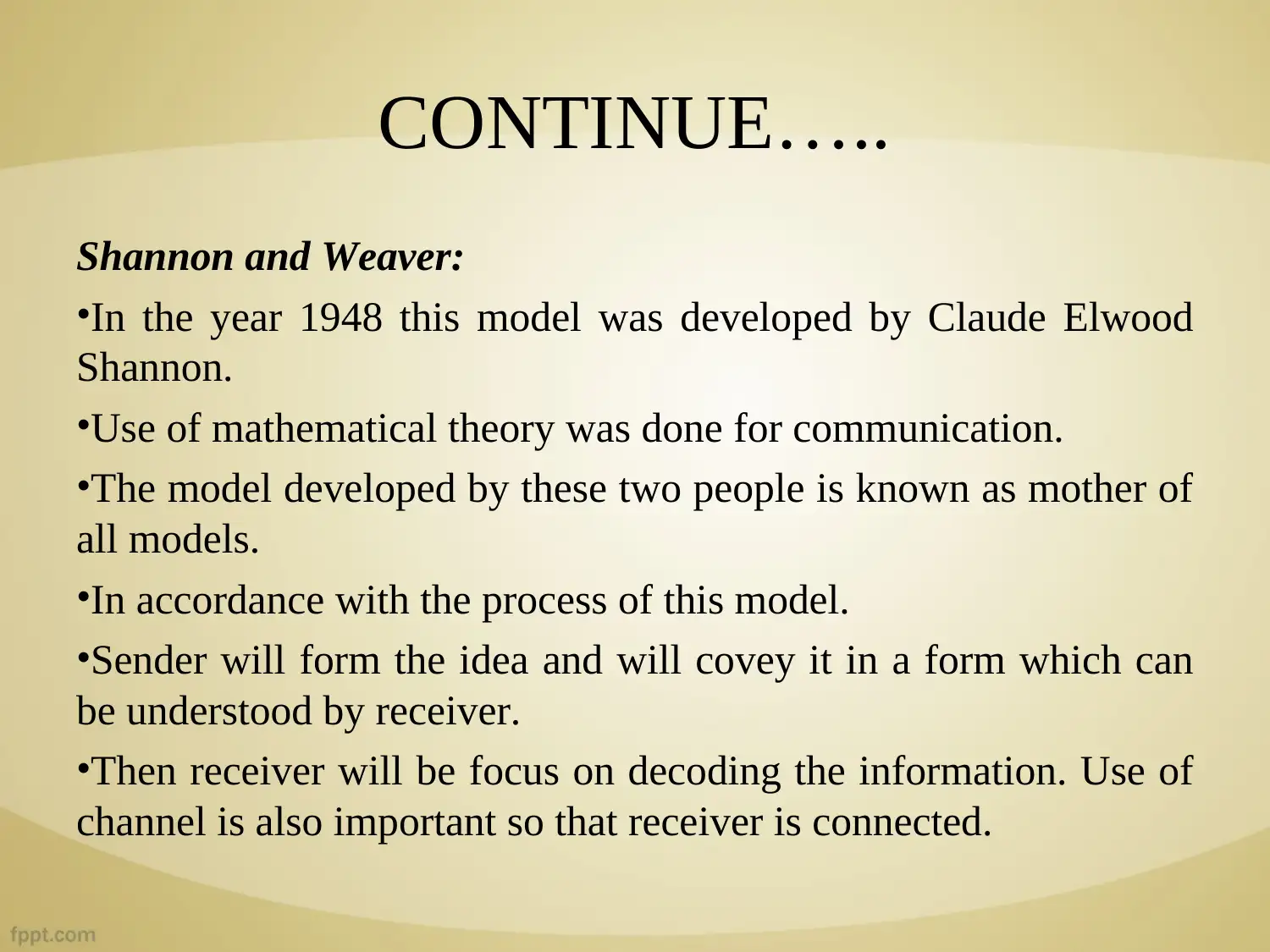
CONTINUE…..
Shannon and Weaver:
•In the year 1948 this model was developed by Claude Elwood
Shannon.
•Use of mathematical theory was done for communication.
•The model developed by these two people is known as mother of
all models.
•In accordance with the process of this model.
•Sender will form the idea and will covey it in a form which can
be understood by receiver.
•Then receiver will be focus on decoding the information. Use of
channel is also important so that receiver is connected.
Shannon and Weaver:
•In the year 1948 this model was developed by Claude Elwood
Shannon.
•Use of mathematical theory was done for communication.
•The model developed by these two people is known as mother of
all models.
•In accordance with the process of this model.
•Sender will form the idea and will covey it in a form which can
be understood by receiver.
•Then receiver will be focus on decoding the information. Use of
channel is also important so that receiver is connected.
⊘ This is a preview!⊘
Do you want full access?
Subscribe today to unlock all pages.

Trusted by 1+ million students worldwide
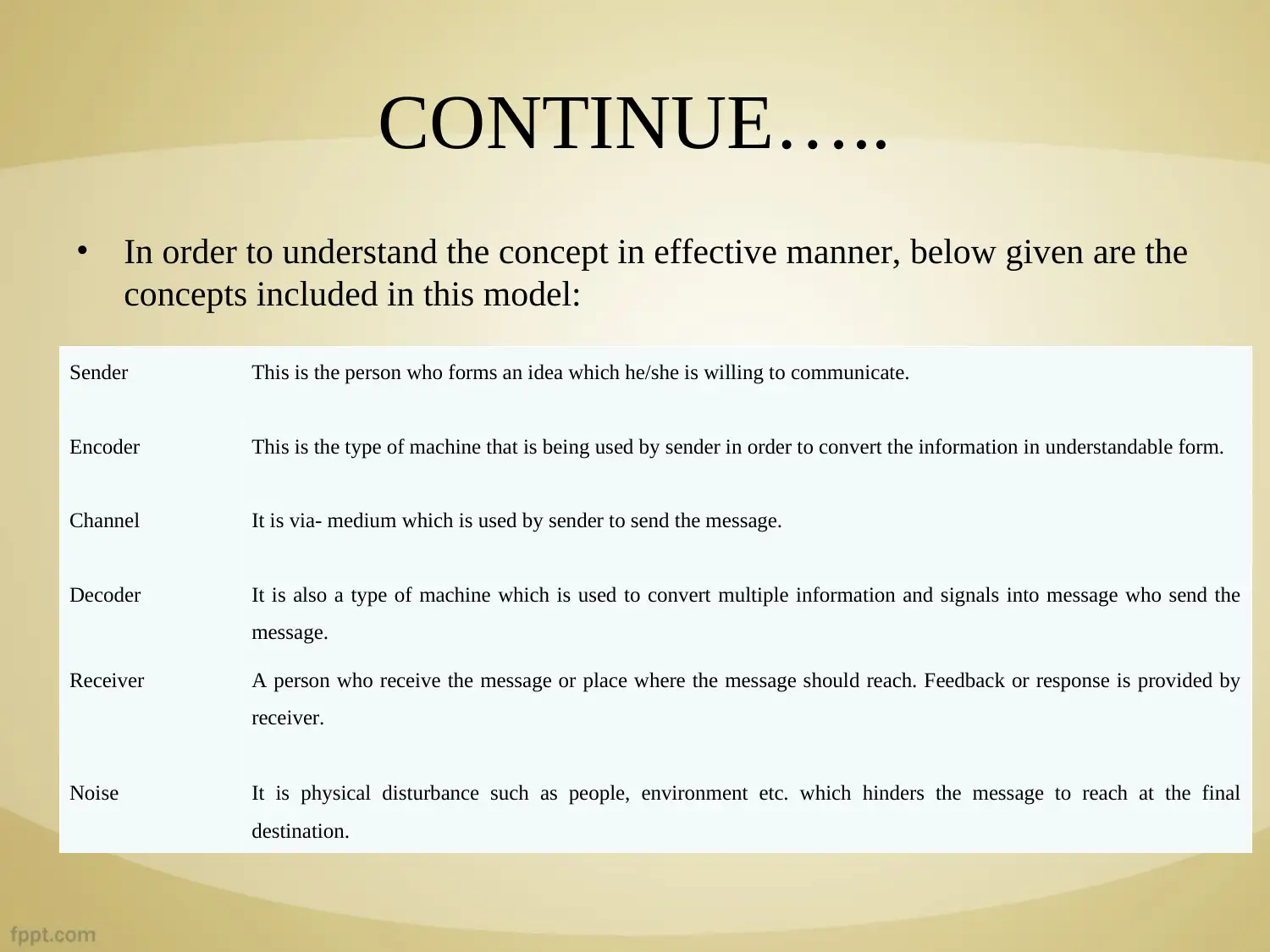
CONTINUE…..
• In order to understand the concept in effective manner, below given are the
concepts included in this model:
Sender This is the person who forms an idea which he/she is willing to communicate.
Encoder This is the type of machine that is being used by sender in order to convert the information in understandable form.
Channel It is via- medium which is used by sender to send the message.
Decoder It is also a type of machine which is used to convert multiple information and signals into message who send the
message.
Receiver A person who receive the message or place where the message should reach. Feedback or response is provided by
receiver.
Noise It is physical disturbance such as people, environment etc. which hinders the message to reach at the final
destination.
• In order to understand the concept in effective manner, below given are the
concepts included in this model:
Sender This is the person who forms an idea which he/she is willing to communicate.
Encoder This is the type of machine that is being used by sender in order to convert the information in understandable form.
Channel It is via- medium which is used by sender to send the message.
Decoder It is also a type of machine which is used to convert multiple information and signals into message who send the
message.
Receiver A person who receive the message or place where the message should reach. Feedback or response is provided by
receiver.
Noise It is physical disturbance such as people, environment etc. which hinders the message to reach at the final
destination.
Paraphrase This Document
Need a fresh take? Get an instant paraphrase of this document with our AI Paraphraser
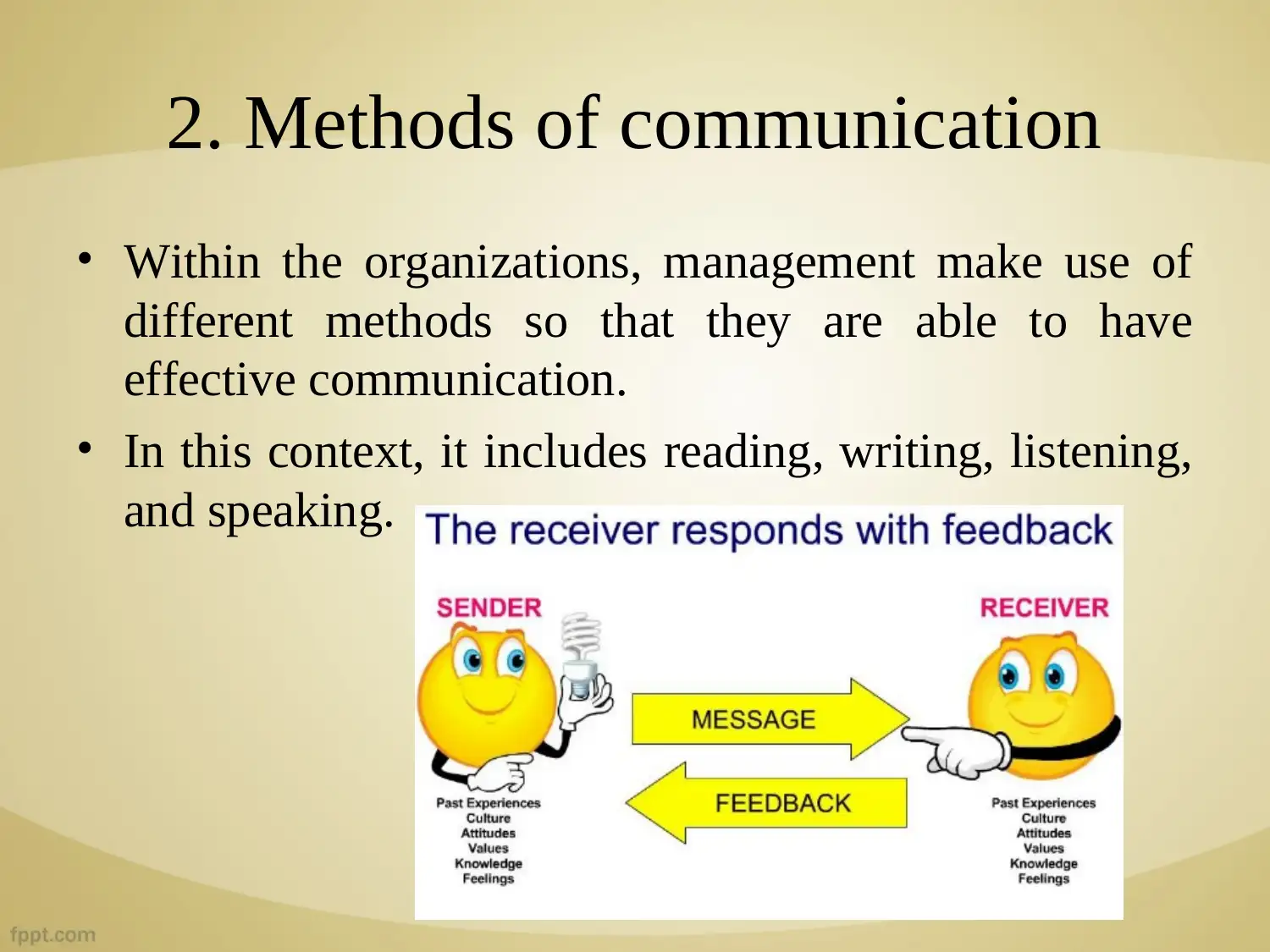
2. Methods of communication
• Within the organizations, management make use of
different methods so that they are able to have
effective communication.
• In this context, it includes reading, writing, listening,
and speaking.
• Within the organizations, management make use of
different methods so that they are able to have
effective communication.
• In this context, it includes reading, writing, listening,
and speaking.
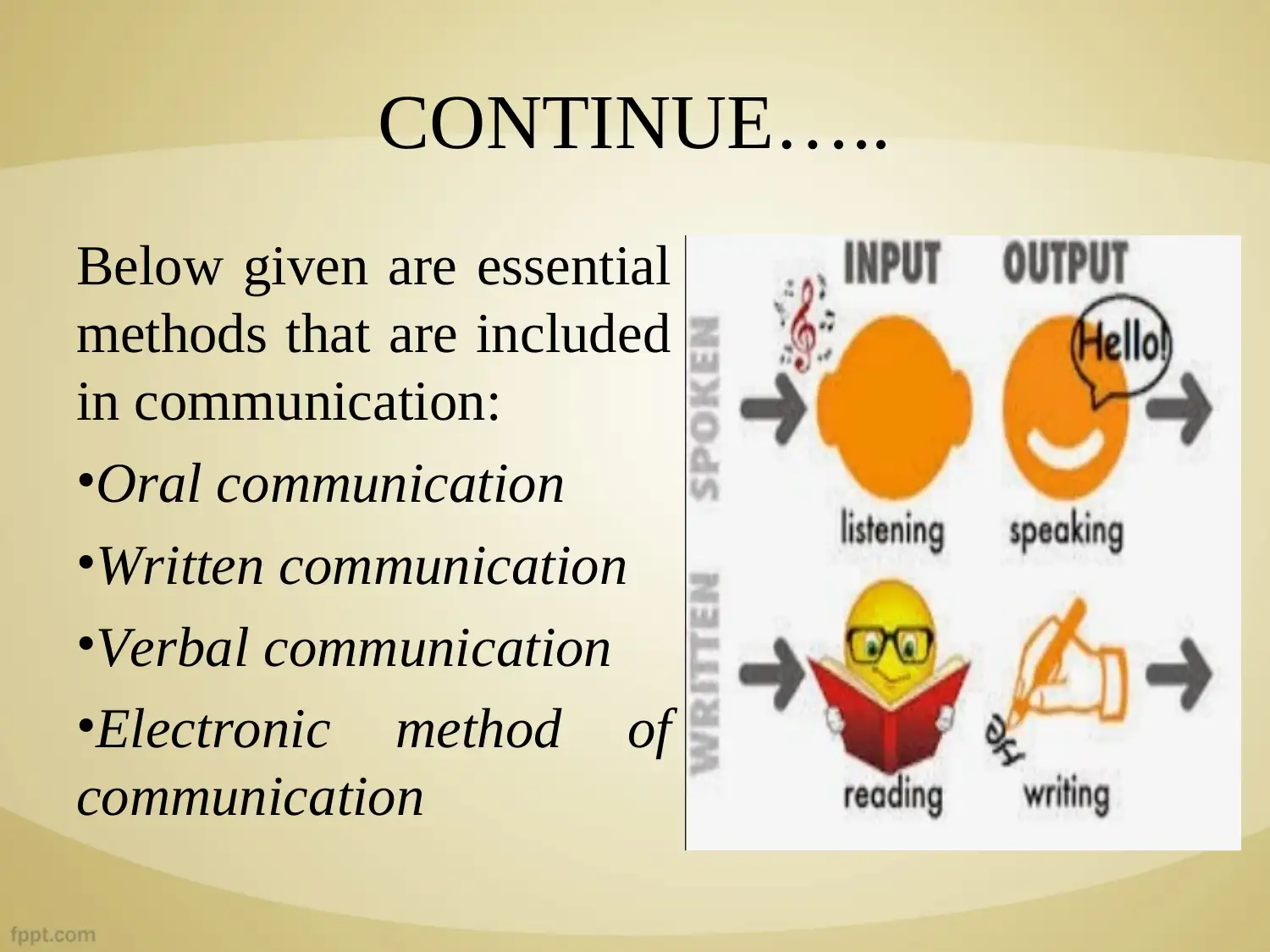
CONTINUE…..
Below given are essential
methods that are included
in communication:
•Oral communication
•Written communication
•Verbal communication
•Electronic method of
communication
Below given are essential
methods that are included
in communication:
•Oral communication
•Written communication
•Verbal communication
•Electronic method of
communication
⊘ This is a preview!⊘
Do you want full access?
Subscribe today to unlock all pages.

Trusted by 1+ million students worldwide
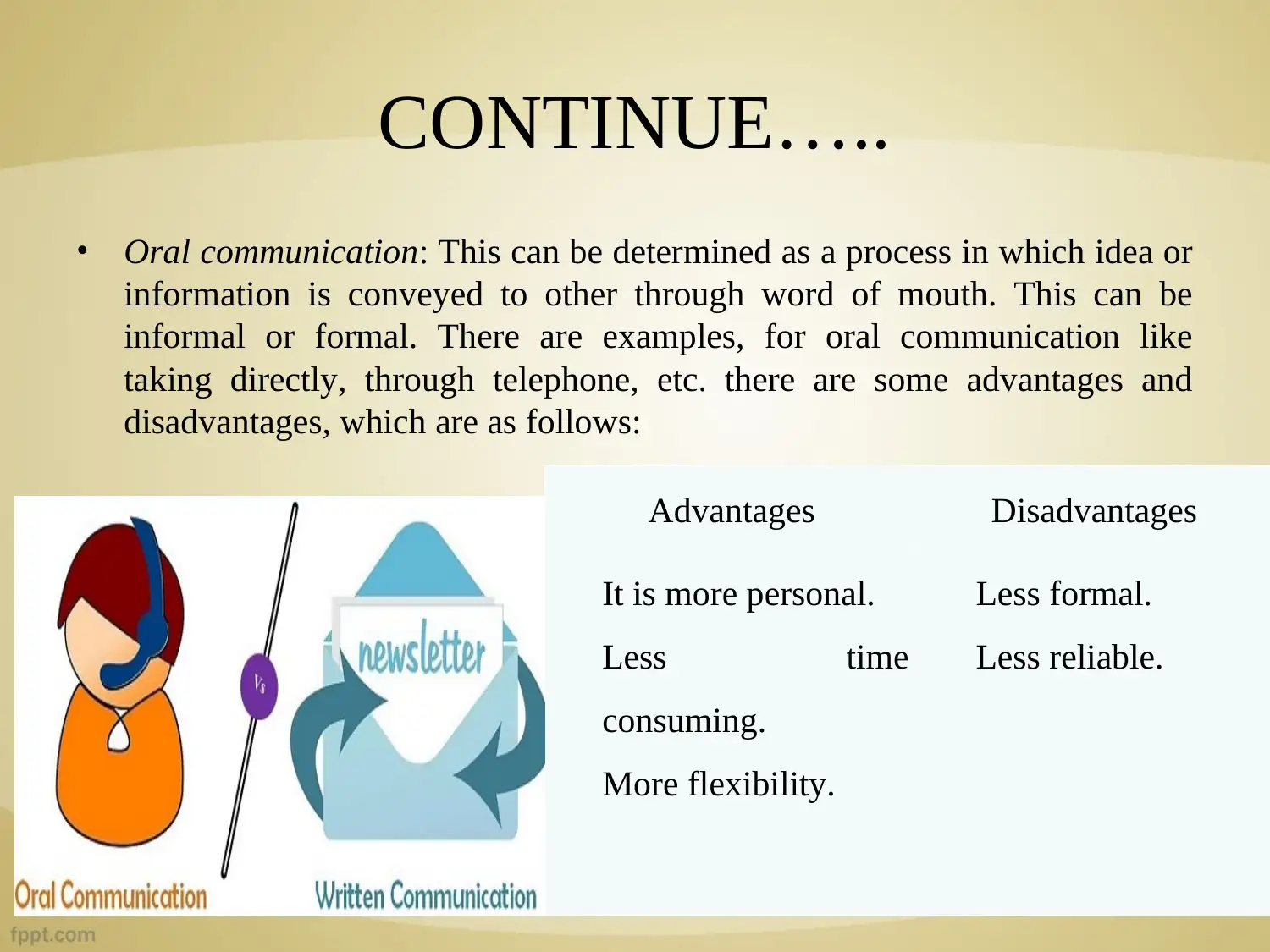
CONTINUE…..
• Oral communication: This can be determined as a process in which idea or
information is conveyed to other through word of mouth. This can be
informal or formal. There are examples, for oral communication like
taking directly, through telephone, etc. there are some advantages and
disadvantages, which are as follows:
Advantages Disadvantages
It is more personal.
Less time
consuming.
More flexibility.
Less formal.
Less reliable.
• Oral communication: This can be determined as a process in which idea or
information is conveyed to other through word of mouth. This can be
informal or formal. There are examples, for oral communication like
taking directly, through telephone, etc. there are some advantages and
disadvantages, which are as follows:
Advantages Disadvantages
It is more personal.
Less time
consuming.
More flexibility.
Less formal.
Less reliable.
Paraphrase This Document
Need a fresh take? Get an instant paraphrase of this document with our AI Paraphraser
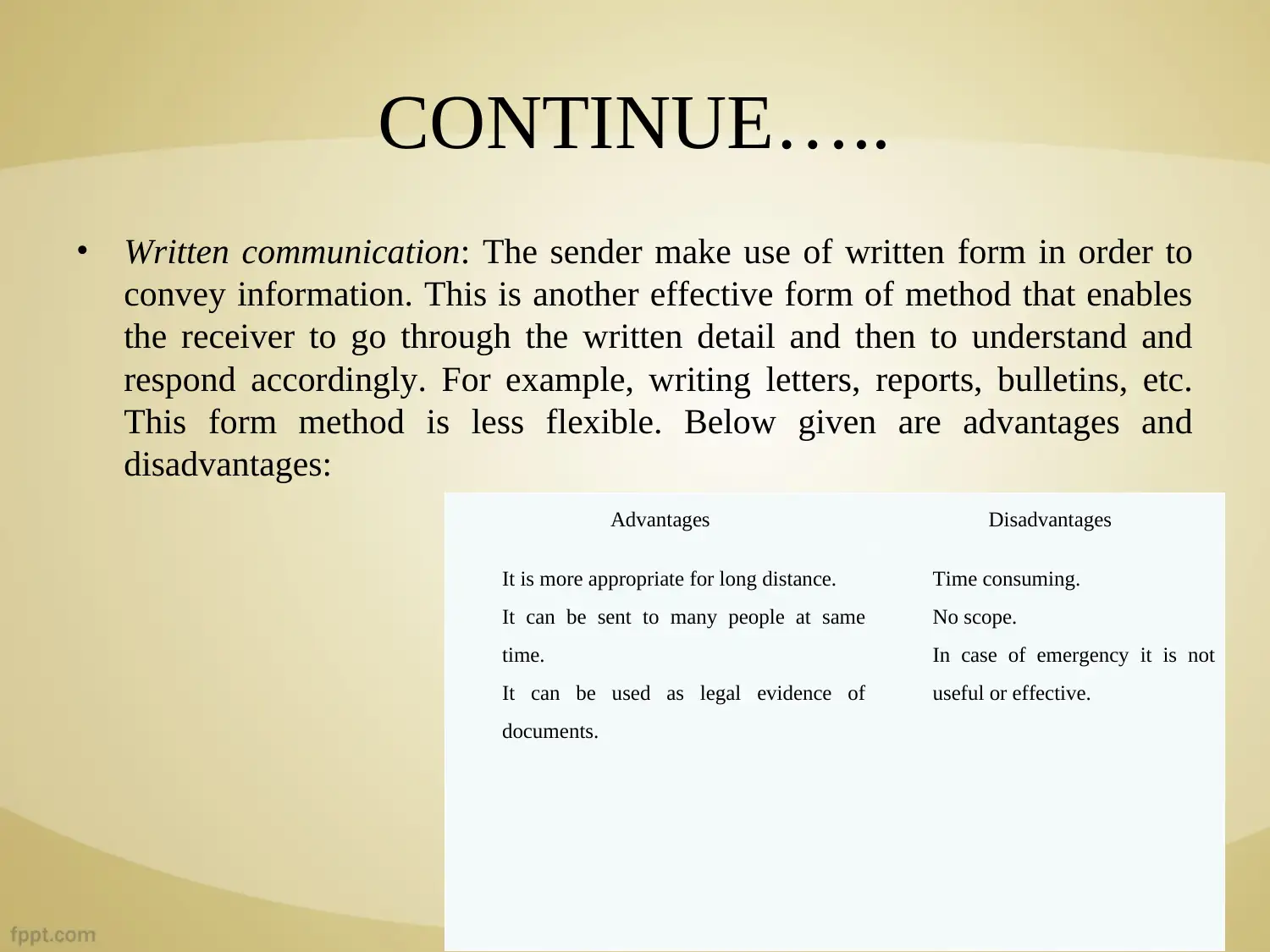
CONTINUE…..
• Written communication: The sender make use of written form in order to
convey information. This is another effective form of method that enables
the receiver to go through the written detail and then to understand and
respond accordingly. For example, writing letters, reports, bulletins, etc.
This form method is less flexible. Below given are advantages and
disadvantages:
Advantages Disadvantages
It is more appropriate for long distance.
It can be sent to many people at same
time.
It can be used as legal evidence of
documents.
Time consuming.
No scope.
In case of emergency it is not
useful or effective.
• Written communication: The sender make use of written form in order to
convey information. This is another effective form of method that enables
the receiver to go through the written detail and then to understand and
respond accordingly. For example, writing letters, reports, bulletins, etc.
This form method is less flexible. Below given are advantages and
disadvantages:
Advantages Disadvantages
It is more appropriate for long distance.
It can be sent to many people at same
time.
It can be used as legal evidence of
documents.
Time consuming.
No scope.
In case of emergency it is not
useful or effective.
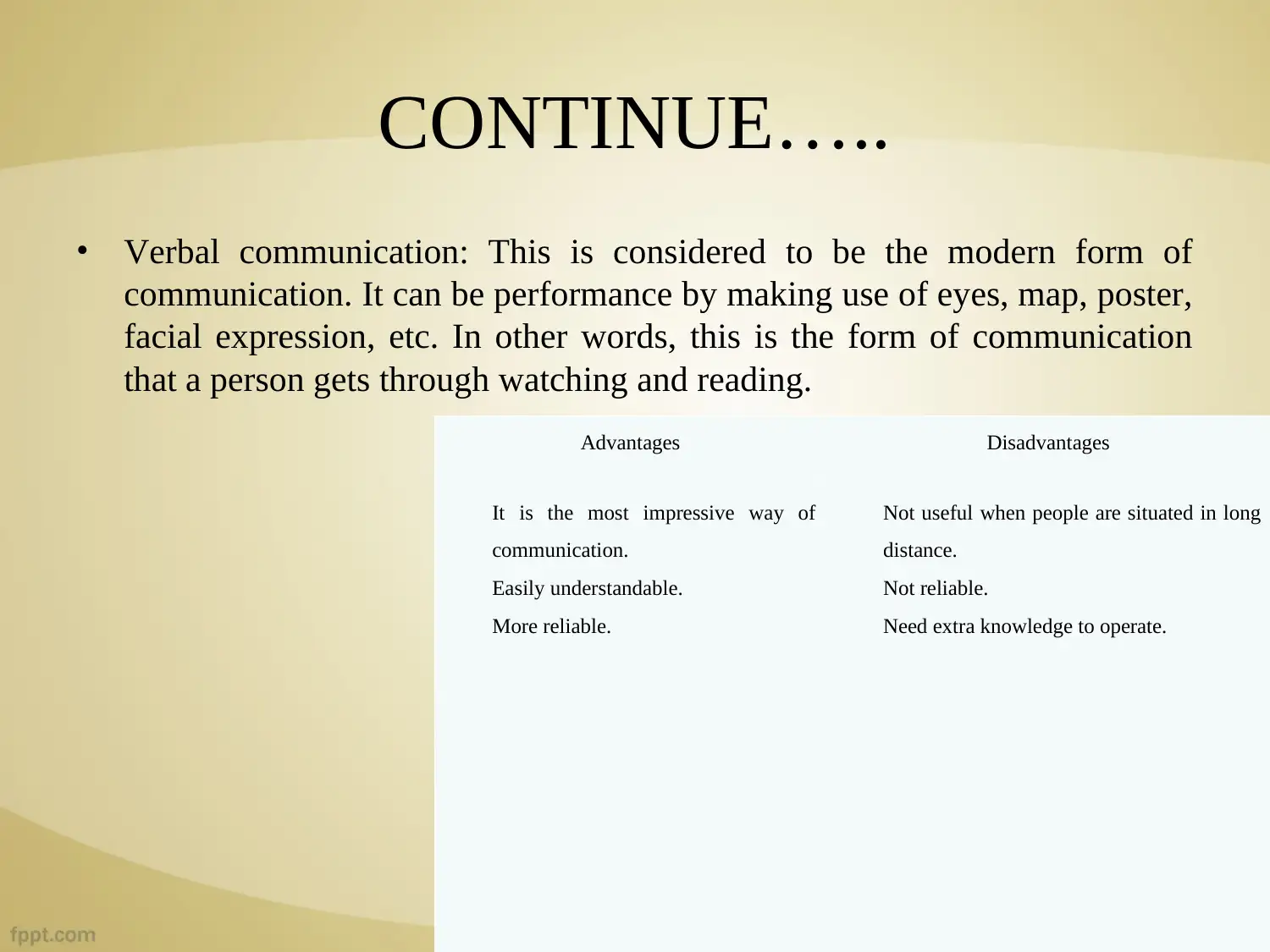
CONTINUE…..
• Verbal communication: This is considered to be the modern form of
communication. It can be performance by making use of eyes, map, poster,
facial expression, etc. In other words, this is the form of communication
that a person gets through watching and reading.
Advantages Disadvantages
It is the most impressive way of
communication.
Easily understandable.
More reliable.
Not useful when people are situated in long
distance.
Not reliable.
Need extra knowledge to operate.
• Verbal communication: This is considered to be the modern form of
communication. It can be performance by making use of eyes, map, poster,
facial expression, etc. In other words, this is the form of communication
that a person gets through watching and reading.
Advantages Disadvantages
It is the most impressive way of
communication.
Easily understandable.
More reliable.
Not useful when people are situated in long
distance.
Not reliable.
Need extra knowledge to operate.
⊘ This is a preview!⊘
Do you want full access?
Subscribe today to unlock all pages.

Trusted by 1+ million students worldwide
1 out of 16
Related Documents
Your All-in-One AI-Powered Toolkit for Academic Success.
+13062052269
info@desklib.com
Available 24*7 on WhatsApp / Email
![[object Object]](/_next/static/media/star-bottom.7253800d.svg)
Unlock your academic potential
Copyright © 2020–2026 A2Z Services. All Rights Reserved. Developed and managed by ZUCOL.





